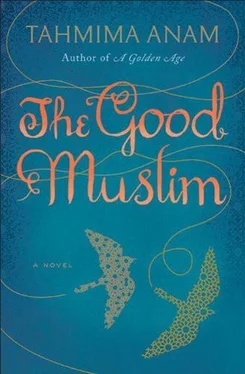‘Eat,’ she said, pinching Maya’s cheek; ‘you’re too skinny. Who’s going to marry you?’
At Bahadurabad, Maya boarded the ferry. It was afternoon now, and the sun danced on the wide expanse of river. She waved her ticket at the ferryman and pushed her way to the deck, where she was the only woman who chose to sit in the full glare of the sun. The Padma lapped at the ferry, gentle, hiding the force of its current. She munched on a packet of biscuits, trying to remember if this was the same boat that had brought her to Rajshahi. That one had a strange name. ‘Hey,’ she called out to a young boy in a uniform. ‘What’s the name of this boat?’
‘ Padma .’
It must have been a different boat. That journey, running away from home, seemed a lifetime ago. She had turned to her old friend Sultana. They had volunteered together at the refugee camps during the war, Sultana shocking everyone by driving the supply truck herself. Maya always remembered what Sultana had told her that long summer before independence: that she dreamed of going home after the war, not to the city, but back to her father’s village. ‘I want to feel the earth pulling at my feet,’ she had said. After the book burning, when Maya had decided there was nothing to do but leave, she had telephoned, asking if she might come to stay. Sultana told Maya
she had recently married a boy she had known since childhood, a doctor. Together they worked at a clinic in Tangail; she could come; they could use her help.
She had stayed for three months, but Tangail was too close to Dhaka. Every day Maya stared at the buses shuttling towards the city, daring herself to climb aboard one and go home. And Sultana and her husband were newly married. Maya caught them kissing in the kitchen, their mouths open, his hands in her hair.
She left, wandered around the country on trains, ferries and rickshaws, finally arriving at the medical college hospital in Rajshahi town. She volunteered again, and then applied to finish her internship. After two years at the hospital, she was given permission to start a clinic of her own. It was Nazia who had given her the idea, Nazia who had come all the way to town on the back of a rickshaw-van, her baby stuck in the breech position. Impossible, Maya argued, for the women to travel all the way to the hospital to give birth. Too many babies were dying.
Somewhere along the way she had decided to become a lady doctor instead of a surgeon. She had seen how the women’s faces changed when she entered the chamber, relaxing their grip on the examining table. At the time she told herself it was a practical matter. Anyone could become a surgeon, but a doctor for women, a doctor who could deliver their babies and stitch their wounds afterwards and teach them about birth control — that is what they needed. She didn’t think of the debt she was repaying, that each of the babies she brought into the world might someday be counted against the babies that had died, by her hand, after the war.
They had never had a clinic in the village. Nazia spread the word, describing how Maya had saved her and her baby from certain death, how she had ordered the nurses about at the hospital, how expertly she had inserted the needle into her arm. That year, before the monsoon, Maya taught everyone in the village how to make oral-rehydration fluid: a handful of molasses, a pinch of salt, a jug of boiled water. And they passed that season without a single dead child. By the following year, when she succeeded in petitioning the district to build them a tube well, she believed she had won their hearts.
Nazia and Masud had another child. They named her Maya.
It was dark by the time the ferry reached the dock at Jaggannathganj. Maya checked her watch, wondering if it was too late to catch the last train. The tree was heavy in her arms, the branches pricking her shoulder. She decided to try; it would be difficult to find a hotel here, and they would ask her questions: why she was travelling alone, why she didn’t have a man with her, a husband, a father.
At the station she saw the old woman from the train, her tiffin carrier open. Maya went over and waved, strangely elated at the sight of her. The woman beckoned her closer.
‘Eat, eat,’ she said.
‘Grandmother,’ Maya said, ‘how is it your tiffin carrier is always full?’
The woman smiled, revealing a set of tiny, betel-stained teeth. Maya dipped a piece of bread into the curry she offered, suddenly famished.
Hours later, in the molten dark of night, the overnight train pulled into the station, and Maya helped the old woman on board. Five hours to Dhaka, she whispered to herself, reciting the names of the stations: Sirajganj, Mymensingh, Gafargaon. Only five more hours.
*
Maya thought she might be overcome at the sight of Dhaka. She imagined the waves of nostalgia that would coast over her, forcing her to remind herself of the necessity of the last seven years away. She imagined emerging into the cool February afternoon, clouds moving fast overhead, and remembering everything about her old life — all the days she had spent at the university, the rickshaw rides to Ramna Park, Modhumita Cinema and the Racecourse, regretting the spare years in the country. But, as she stepped out of Kamalapur Station, she saw that everything was loud and crude, as though someone had reached over and raised the volume. It smelled of people and garbage and soot. She saw how tall everything had grown — some buildings reached five or six storeys — and how her rickshaw-puller struggled to weave through the thicket of cars on Mirpur Road, horns blaring impatiently; and she saw signs of the Dictator everywhere, graffiti on the walls declaring him the ‘General of Our Hearts’ and the ‘Saviour of Bangladesh’, posters of him ten, twenty feet tall, with his high forehead, his thin, satisfied moustache.
An hour later Maya was standing in front of the house of her childhood, Number 25, clutching her rucksack and wondering what she would find within.
Her eyes adjusted to the new contours of the building. The decline was far worse than she had imagined. Here, grey streaks across its back, where the drainpipe had leaked; there, the slow sinking of its foundations, as if the house were being returned to the earth; and, above, the collection of shacks that made up the first floor, built by her brother out of a mixture of brick and tin and jute, making it appear as though an entire village had fallen from the sky and landed on the rooftop.
She had loved this house once. It was the only place where she could conjure up the memory of her father — his elbows on the dining table, his footsteps on the verandah. Sliding off his chappals and raising his feet on to the bed. The smell of his tweed suit on a humid day. And lodged into the bone of this house was every thought and hope and bewildered fantasy she had ever harboured about her life, about the war she had fought and won, about the woman and man she had imagined she and her brother would become; but after it was all over, the killing and the truce and the redrawing of the border, he had gone one way, and she another. And she had foreseen none of it.
There is no time to linger, she told herself. Pull up your socks and go inside.
Everything was quiet and shining. The wooden arms on the sofa gleamed. The tiny brass chandelier was polished, the lace runner on the table starched and fixed perfectly in its place. Cushions with pointy edges. It came back to her, the way her mother always kept the house, as though a guest might arrive at any moment and run her finger along the windowsill, checking for dust.
The house was modest: three rooms set out in a row, connected by a verandah that faced the garden. At the far end, a kitchen with its own small porch. This was where she headed now, sure she would find her mother bent over the stove or washing the breakfast plates.
Читать дальше












